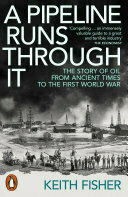
'Fascinating revelations' Max Hastings, Sunday Times 'An immensely valuable guide to a great and terrible industry' The Economist 'The book I have long been waiting for... Essential reading' Michael Klare Petroleum has always been used by humans: as an adhesive by Neanderthals, as a waterproofing agent in Noah's Ark and as a weapon during the Crusades. Its eventual extraction from the earth in vast quantities transformed light, heat and power. A Pipeline Runs Through It is a fresh, in-depth look at the social, economic, and geopolitical forces involved in our transition to the modern oil age. It tells an extraordinary origin story, from the pre-industrial history of petroleum through to large-scale production in the mid-nineteenth century and the development of a dominant, fully-fledged oil industry by the early twentieth century. This was always a story of imperialist violence, economic exploitation and environmental destruction. The near total eradication of the Native Americans of New York, Pennsylvania and Ohio has barely been mentioned as a precondition for the emergence of the first oil region in the United States. The growth of Royal Dutch-Shell involved the genocidal subjugation of people of the Dutch East Indies and the exploitation of oil in the Middle East arose seamlessly out of Britain's prior political and military interventions in the region. Finally, in an entirely new analysis, the book shows how the British navy's increasingly desperate dependence on vulnerable foreign sources of oil may have been a catalytic ingredient in the outbreak of the First World War. The rise of oil has shaped the modern world, and this is the book to understand it.